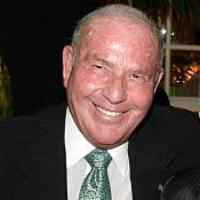U.S. Ambassador to Hungary: Who Is David Cornstein?
 David Cornstein (photo: Patrick McMullan, Getty Images)
David Cornstein (photo: Patrick McMullan, Getty Images)
David B. Cornstein, nominated February 13, 2018, to be the next United States ambassador to Hungary, has a lot in common with President Donald Trump. They’re both New Yorkers who have winter homes in Palm Beach, they’re both very rich and they’ve both led money-losing gambling operations.
Cornstein was born in New York City on August 17, 1938. An only child, his father, Irwin, was in the rug business and his mother, Fanny, whose parents were immigrants from Hungary, a schoolteacher. Cornstein attended P.S. 168, but then transferred to the Horace Mann School, where he graduated in 1956. He went to Lafayette College in Easton, Pennsylvania, where he earned a B.A. in 1960 before returning home to attend New York University. He graduated NYU in 1963, earning a Master of Science degree from the School of Retailing. Cornstein also served in the Army Reserve as a cook.
While working on his masters, Cornstein was presented with an opportunity to enter the jewelry business, owning the fine jewelry business at a Long Island JC Penney store. The venture was a success and he expanded it into a company called Tru-Run, taking over fine jewelry sales in many department stores. In 1985, he completed a buyout of a similar but larger company, Seligman and Latz. At the end of 1988, he and partners purchased Finlay Fine Jewelry for $217 million. Cornstein became the president and chief executive of the holding company Finlay Enterprises Inc. In 1989, he maintained that despite economic slowdowns, the retail jewelry industry was not endangered because, “so long as there is romance and Christmas, demand for jewelry will be robust.” Finlay continued to grow, branching out into Europe in the 1990s. One expansion that didn’t work was the attempt to put fine jewelry counters in Crazy Eddie appliance stores in the New York area. Cornstein resigned from Finlay in January 1999.
Cornstein’s interests weren’t confined to the jewelry business. In 1991, he considered making a bid for the New York Daily News as he looked into running for mayor of New York. Cornstein also looked at a race to unseat Gov. Mario Cuomo (D) in 1994. The closest Cornstein got to being an actual candidate was in 2001, when he declared himself a candidate for New York State controller. He pledged to spend $12 million of his own money. He ran into problems from the beginning when, on the invitation for his formal announcement fund-raiser, he included New York Mayor Rudolph Giuliani as one of the evening’s honorary chairs…without Giuliani’s permission. Most other Republicans leaders were backing another candidate, John Faso, so Cornstein dropped out of the race. Governor George Pataki immediately gave Cornstein the chairmanship of the New York State Olympic Games Commission as it prepared a bid for the 2012 games, which eventually went to London.
Cornstein was also involved in horse racing from two angles. He was appointed to the New York Off-Track Betting Commission (OTB) in 1994, eventually becoming its chairman. He promoted such ideas as having races televised live and setting up an 800 number to allow gamblers to wager by phone. He was demoted from chairman to board member in June 2009 when OTB was in deep financial trouble. Cornstein did have success as a horse owner. His horse Grand Slam finished seventh in the 1998 Belmont Stakes and second in that year’s Breeders’ Cup Sprint. Another horse, Proud Citizen, finished second in the 2002 Kentucky Derby, third in the Preakness and fifth in the Belmont Stakes.
In September 1999, he was named chairman of TeleHubLink, a telemarketing company that later began producing wireless encryption products. He had been a director of What A World! since July 1993, before it changed its name to TeleHub. His connection with TeleHubLink got him into a little trouble in April 2001 when TeleHubLink was accused by New York State Attorney General Eliot Spitzer of violating consumer protection laws through a telemarketing credit card scheme. The charges held up. As for Cornstein’s problem with Eliot Spitzer—not to worry. Five years later, Cornstein, although a Republican, contributed to Democrat Spitzer’s gubernatorial campaign.
The TeleHubLink fraud case did not derail Cornstein’s appointment to the board of the Battery Park City Authority, which was confirmed in May 2001.
In 2006, Cornstein was elected chairman of the board of the Jewelers' Security Alliance.
More recently, Cornstein has been chairman of Circa, a company that buys high-end used jewelry, and is the president and principal of Pinnacle Advisors Limited, a private wealth management company that handles the investments of 1,250 families with average accounts of $1.6 million.
Cornstein and his wife, Sheila, have a son, Marc, who is a sports agent.
-Steve Straehley, David Wallechinsky
To Learn More:
David B. Cornstein Executive Profile (Bloomberg)
The Nathan Detroit of Candidates, OTB’s Cornstein Is Finally Running (by Josh Benson, New York Observer)
- Top Stories
- Unusual News
- Where is the Money Going?
- Controversies
- U.S. and the World
- Appointments and Resignations
- Latest News
- Musk and Trump Fire Members of Congress
- Trump Calls for Violent Street Demonstrations Against Himself
- Trump Changes Name of Republican Party
- The 2024 Election By the Numbers
- Bashar al-Assad—The Fall of a Rabid AntiSemite






Comments